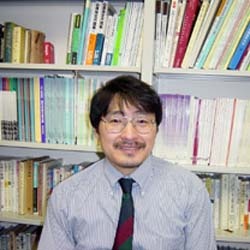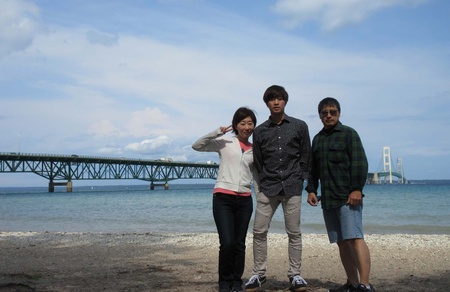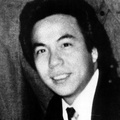As Dean of the School of Education at Nagoya University what are your responsibilities? You travel a lot to the US and Canada. What is that about?
JT: I serve mainly as the representative of the School (of Education), given a seat at various meetings for university management. I joked with my wife that I would have calluses on my ass from sitting through meeting after meeting. Actually, it wasn’t really a joke. My buttocks have flattened out in recent times. Or is that aging? There’s a lot of mediation between faculty and students who have a gripe against each other.
I am also charged with managing the budget, so I am held accountable for suspicious tabs. I also do a lot of PR stuff, trying to wring out some bucks out of alumni and the parents of current students, and we have to recruit quality prospects from nearby high schools. When I visit the high schools, I badmouth our competing universities, and other majors within our school, and they get a good laugh out of it since they don’t expect such a distinguished speaker, a Dean from the prestigious Nagoya University, to be talking in-your-face rather than in the polite, formal style that other speakers are assuming.
I still teach, mainly in grad school, but I enjoy the one undergrad class that I have in cross-cultural psychology. The themes vary from year to year, but recently, I talk a lot about Asian hatred that’s hitting us in North America.
People blame Trump for talking about the “China virus”, but it’s a lot more than that. We all have esteem needs, and if you can’t attain self-esteem on your own merits, you turn to your group, which often is your racial or ethnic group. By dissing other groups, you feel your group is on top. The more you diss, the better your group seems. We call this collective self-esteem, a social poison of sorts, but something essential for some people toward maintaining their self-worth.
The pandemic has given Asians a weakness on which hating people can capitalize upon, so that they find in us an opportunity to raise their self-esteem. Having taught about such psychological processes behind Asian hatred, one student came up to me, saying, ‘I had planned to study abroad, but now that I have heard your lecture, I think I will stay in Japan.’ Wise decision my son.
I do get to travel often, as the prime international figure of our School, not necessarily because I am Dean. We just got back from signing an agreement with University of Windsor to engage in collaborative activities. When I was Associate Dean of International Affairs, I set my sights on Canada to look for potential partners.
Most of the renown US universities would not even meet with us, as they sought for Chinese partners, who are ranked much higher than us, and they have heaps of money. The Chinese universities would pay for high tuition to have their students study short and long term at these institutions, bringing them lots of revenue. Japan is so poor now, the government has not allowed us to raise our tuition in 20 years.
Through our North American agreements, our students get a $50K waiver in tuition, while theirs only get our $3K waived. Yeah, that’s right, the cost of annual tuition at a Japanese university is like two weeks’ worth of your Canadian salary. In fact, if you take my annual salary to Canada, it will only last six months, maybe three if you are talking Greater Toronto.
What's the reaction of your colleagues when they learn that you grew up and were educated in Canada and the USA? Do they distinguish you in any way as an "other", different from Japanese born and educated academics?
JT: Nobody knows I’m a pseudo nisei unless I tell them. The only give away is the way I dress. While I am a Dean, and mind you Deans are supposed to be clad in suits, I wear my signature Canadian lumberjack red and black plaid shirt and torn jeans. I would wear my Kodiak work boots too, if not for the humidity in this country.
I don’t speak English in front of my colleagues, or any Japanese person for that, because I have been turned off by kikokushijo peers during my ICU days, who took pleasure in showing off their English abilities. This was Japan, and they were more Japanese than I was, yet they would order burgers at Micky D’s in English, confusing the poor employee. They would talk nasty about Japan too (again in English), and glorify their time overseas, how much sanitary and civilized their country was. Most left Japan after graduation to go “home.” Love it or leave it, eh? I hope they are getting smacked for the kung flu thing, wherever they may be. See how they like it now!
Their sense of superiority in being able to speak English is embedded within this thing about Japanese society, which has systemic favouritism for and reverence of white people. Just turn on the TV, and tell me how many ads you see featuring beautiful white stars and models mumbling dumb meaningless scripts in English.
Hakujin (white people) are few in number in actual society, but the ones you have contact with in daily life is likely going to be your teacher. From school on up to adulthood, Japanese learn English from their hakujin teacher. That means hakujin have higher status, i.e. they are our sensei, and we are their students. We have everything to learn from them, and very little to teach them back.
I have seen 50-year old company bigshots using keigo (honorifics) toward their hakujin sensei, 20 years their junior, taking him out to dinner, dragging a small crowd of unwilling subordinates with them, scolding them when they fail to see that sensei’s glass of beer needs a refill. When sensei talks, they are round eyed (how is that possible for us eh?), nodding, and smiling, repeating “honto (really)?” Some sensei are perplexed as to why the Japanese laugh every time they say something, even if it isn’t funny. I would like to know myself. We unconsciously feel obliged to bow down and kiss up to hakujin as an automatic response.
My colleagues would not know I grew up in Canada, unless I would tell them. They voted me in for Dean twice, so they must confide in me. I’m not an arrogant Westerner wannabe, and I continuously monitor how others react to me, adapting myself to them as warranted, just like a typical Japanese. But it’s a whole ‘nother story when it comes to the Canadian me!
Have you given much thought to where you want to be in the future? Is returning to Canada when you retire an option that you have considered?
JT: I am not budging from where I am now. It’s safe, the weather is fantastic, everything is cheap, the people are polite, food is delicious, and I can keep my butt clean with the Toto washlet in my john. Of course, if there is a decent paying gig in North America after my mandatory retirement at 65, I would definitely consider it. Preferably in California than Northern Ontario, but only if I can buy my gun. If I can’t, off to the Soo I go to be with my old homies, and I do mean old, way older than me. One of the perks of being Asian is that you get to keep your youth much longer, so maybe I can kick their ass again for old time’s sake. Jokes aside, going back to Canada would certainly be an option. The pay is good, standard of living is high, co-workers are not dull, and people appreciate a sense of humour, something the Japanese do not understand. Hell, my lectures are like standup comedy, but not one single Japanese student laughs. In contrast, the kids at UC Santa Barbara thought the sun shone out of my arse.”
Great interview. I've learned a lot. Thanks a lot for doing it. Any final thoughts?
JT: Pleasure was all mine brother. Hey, I sorely miss Canada, and I would still be there if it weren’t for that Japan bashing and Vincent Chin thing. When I step out of Pearson now, I feel like yelling, “Good to be back home!” I see the first dude high on fentanyl, lying on his back at the middle of the intersection, drawing a picture in the sky, then I know for certain that I am home. I often wonder what they are drawing. But seriously, I left my best memories in Canada, and Northern Ontario raised me good—damn good. Much obliged Sault Ste. Marie! Or said in the vintage Soo way, (with fist up in the air) “Sault Ste. Marie, f__ yeah! “ And then you spit.
© 2023 Norm Ibuki







